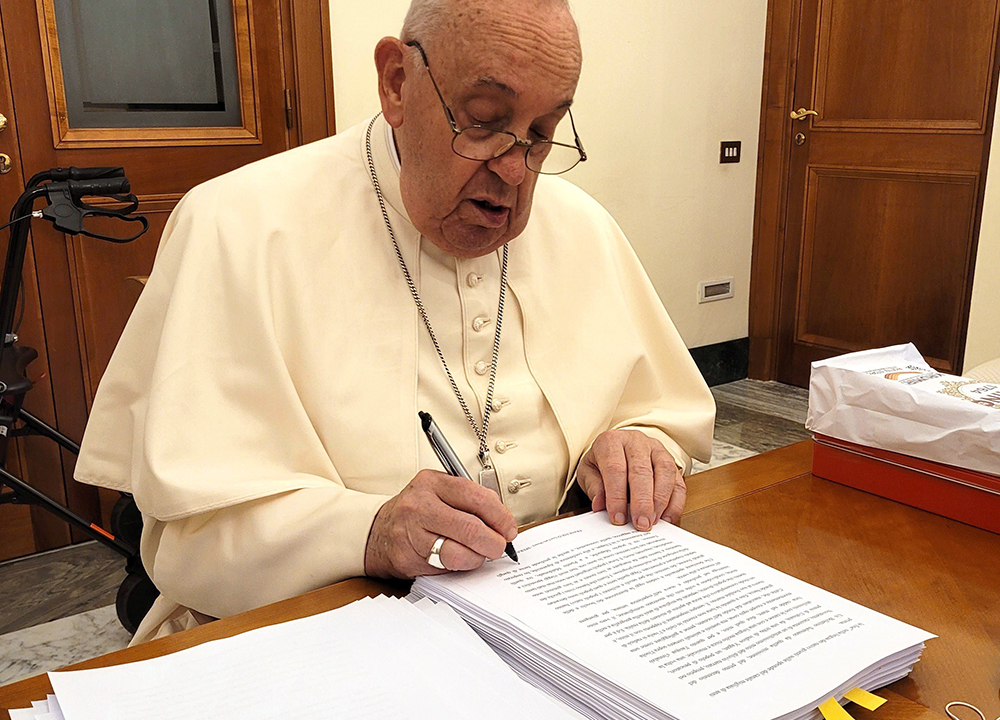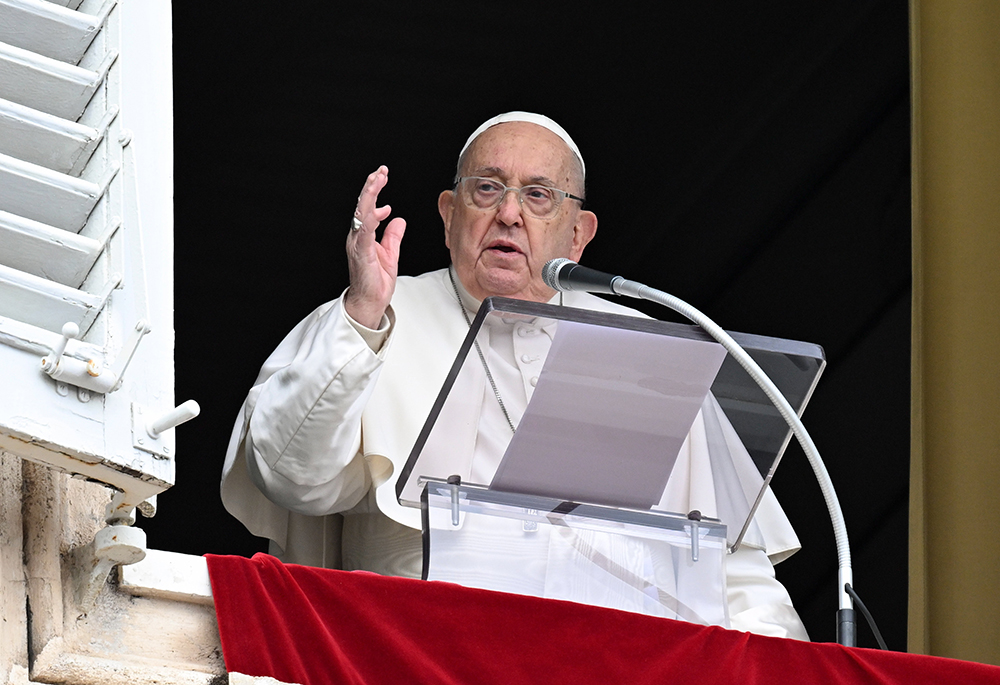
Pope Francis reviews and initials each page of the manuscript of Hope: The Autobiography Aug. 9, 2024, in his Vatican residence, the Domus Sanctae Marthae. The book was released in multiple languages Jan. 14. (CNS/Courtesy of Mondadori)
The iconic image of Barack Obama's 2008 presidential campaign was the retro-style poster of the then-history-making candidate paired with the words "Hope," meant to signal a change in the nation's political life.
In 2013, soon after the election of Pope Francis — another outsider figure — similar images appeared swapping out images of the president with that of the new maverick pontiff. Now, that same title has been chosen for the pope's newly released autobiography, which hit bookstores in some 80 countries this week.
Hope: The Autobiography, written in conjunction with Italian publisher Carlo Musso, is being billed as the first ever memoir by a sitting pope.
But Hope is less autobiography than it is an aggregation of already existing stories, interviews, speeches and history that are already known about the now-88-year-old pontiff.
A forthcoming review in the pages of the National Catholic Reporter will offer a fuller assessment of the book's literary merits. For now, here are five takeaways:
1. Francis is haunted by past shame.
"Melancholy has always been a companion in my life," the pope writes in the text. But it is more than just melancholia that comes through: The book is peppered with stories of regret and humiliation from Jorge Mario Bergoglio's childhood onwards.
Many of the incidents are seemingly minor: ignoring a visit from a housemaid who had cared for his family when he was younger; shying away from taking a photo with his dying father; avoiding visiting a dying priest with whom he was close.
"If I consider what is the greatest gift that I desire from the Lord, and have experienced, it is the gift of shame," he admits.
Since the earliest days of his papacy, Francis has frequently insisted that "God never tires of forgiving." After reading his memoir, one senses that the pope himself is just as much the intended recipient of that message as anyone else.

Pope Francis gives his blessing to visitors gathered in St. Peter's Square to pray the Angelus on the feast of the Baptism of the Lord at the Vatican on Jan. 12. (CNS/Vatican Media)
2. Francis is most emotional when reckoning with the devastation of war.
During a visit to Rome's Piazza di Spagna in 2022, Francis cried when discussing the suffering of Ukrainians following Russia's invasion.
And almost every incident recounted in this memoir when the pope is moved to tears involves a moment when the pope is reminded of the horrors of war: his 2014 visit to Redipuglia military cemetery to commemorate those lost in World War I, a 2017 visit to the American cemetery at Nettuno, Italy, and a 2023 meeting with victims of the protracted war in the eastern region of the Democratic Republic of Congo.
"War is folly!" the pope laments as he recalls the tears he has shed over war. "There is no such thing as a god of war: Anyone who makes war is evil. God is peace."
3. Francis' attention to the peripheries predates his papacy.
The pope has made no secrets about his regular meetings with transgender people at the Vatican or his frequent encounters with the poor and homeless. And even if he bristles at the notion of being characterized as a street priest — and suggests he is unworthy of the title — Francis' attention to society's most marginalized shine through in this book, even from his earliest days as a minister.
No story captures this better than a memory of two "high-class" prostitutes whom he had known for ages. Upon becoming an auxiliary bishop of Buenos Aires, one of them asked him to hear confessions and celebrate Mass for a group of her friends.
The future pope obliged and the two remained in touch until she died.
"I was very fond of her," he writes. "Even now, I don't forget to pray for her on the day of her death."
Advertisement
4. Francis issues strong statements on clergy abuse, LGBTQ Catholics and women's ministries.
The pope's memoir avoids getting into specifics of some of the hot-button issues that have frequently surfaced during his papacy, but when he does venture there, he doesn't mince words.
On clergy sex abuse, the pope briefly mentions the saga of ex-Cardinal Theodore McCarrick, the former archbishop of Washington, D.C., who was revealed to be a serial abuser. "In the justified anger of the people, the Church sees the reflection of God's anger, betrayed and besmirched by these dishonest priests," he writes. "Victims must know that the pope is on their side. And on this he will not take even one step back."
On LGBTQ issues, the pope condemns the criminalization of homosexuality in some 60 countries around the globe.
"Homosexuality is not a crime, it is a human fact, and the Church and Christians cannot remain indifferent in the face of this criminal injustice, nor can they respond faintheartedly," the pope states.
On women's ministries, the pope reiterates the synod's statement that access to the female diaconate remains open to further study and that women should be involved in the training of the church's future priests.
5. Francis stops short of offering an assessment of the resistance to his reforms.
Late into the memoir the pope mentions a large white box he was presented by Pope Benedict XVI soon after becoming pope. Inside the box: details of Vatican corruption and abuse.
While Francis acknowledges that the Roman Curia, the Vatican's central administration, is resistant to change, little is revealed about how he has sought to reform the recalcitrant institution. Hints are dropped about the Vatican's shameful financial investments in a failed London property deal or the blowback he has received from elevating women to top positions of power in the Vatican.
While Hope may be rich in memories from his childhood that shaped the future pope, it is light on revelations about the pontificate itself.
Despite advanced age and limited mobility, Francis insists in the memoir that his overall health is fine and that he intends to press on.
"The reality is, quite simply, that I am old," writes Francis, before adding: "The Church is governed using the head and the heart, not the legs."
The National Catholic Reporter's Rome Bureau is made possible in part by the generosity of Joan and Bob McGrath.






